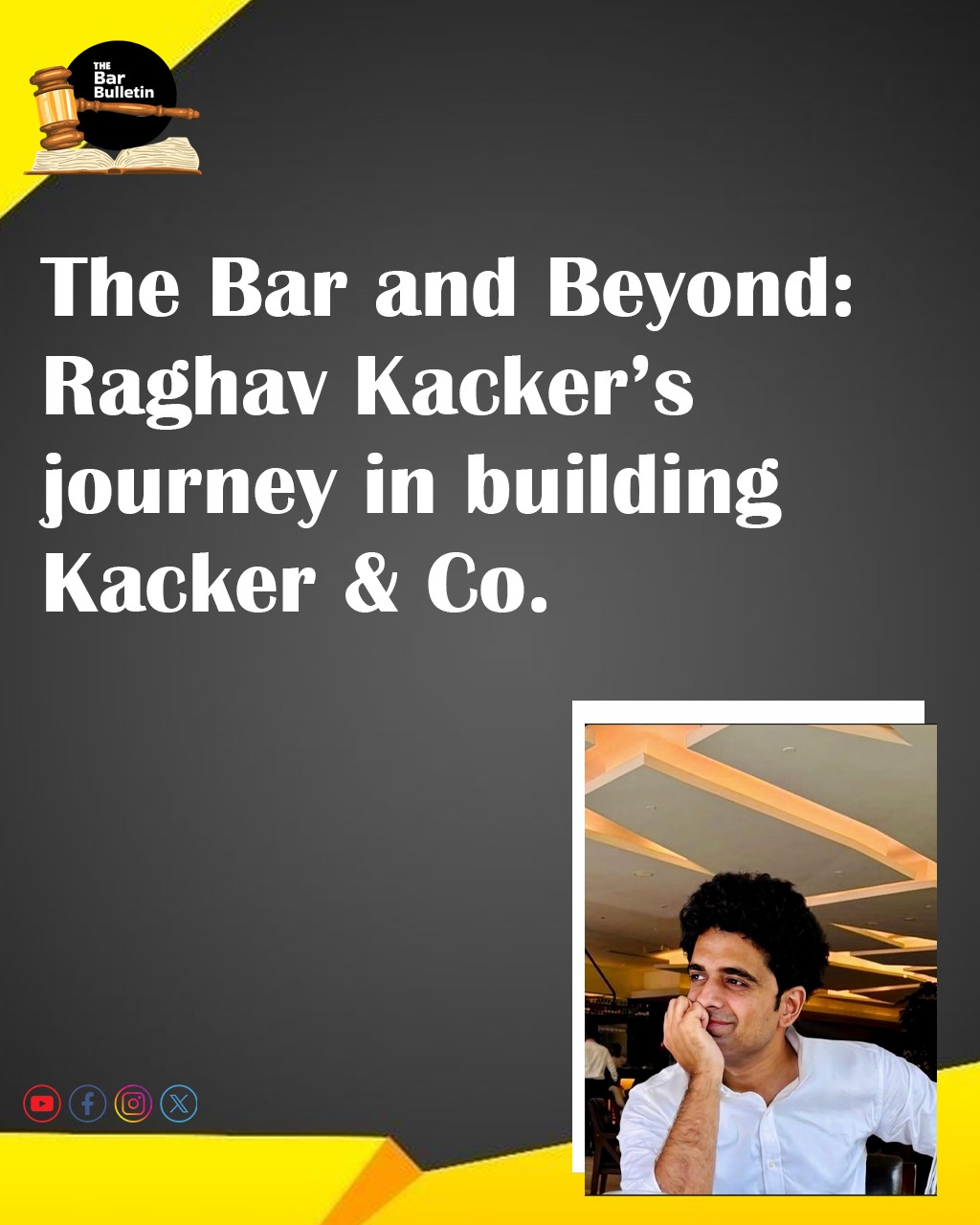Raghav Kacker is a New Delhi-based advocate and founder of Kacker & Co., a litigation-centric law firm. A graduate of Delhi University’s Faculty of Law and Hansraj College, Raghav began his legal career at Karanjawala & Co. and later trained under Senior Advocate Rajshekhar Rao. With extensive experience across the Supreme Court, Delhi High Court, NCLT, NCLAT, TDSAT, and other forums, he regularly represents clients in high-stakes civil, commercial, and constitutional matters.
- You’ve had a rich academic journey from Hansraj College to Delhi University’s Faculty of Law. What initially drew you to the legal profession?
I read Economics at Hansraj and was originally set to join McKinsey as a consultant. Serendipitously, at the same time, I also cleared the entrance to the Faculty of Law at Delhi University. What began as a contingency plan turned out to be a defining moment in my life, law didn’t just give me a profession, but also a sense of purpose and intellectual fulfilment that I hadn’t anticipated. Often my mind wanders back to what my life would have been like, had I continued as a consultant, followed by the mundane MBA, and eventually a job as an investment banker. Through all these musings, it always comes back to me, crystal clear, in many ‘Frosty’ ways, I took “The Road Less Travelled”, and that ended up making all the difference. While I do not recall a singular aspect that drew me into the profession, but being able to play a small role, in justice being done, at some place, at some point in time, was enough to for me to know that this profession is for keeps. As time drew on, I also became increasingly interested in the business of law, which eventually led me to start my own law firm, while ensuring that my core strength in the knowledge and strategic practice of the law, continues to grow.
- From your early years at Karanjawala & Co. to founding your own firm, what have been the most defining moments in your career so far?
My formative years at Karanjawala & Co. were invaluable. I had the privilege of sitting on the same floor as Mr. Raian Karanjawala, where I witnessed firsthand how a solicitor’s mind operates — strategic, surgical, and always ten steps ahead. Founding my own firm would not have been possible without the lessons I learnt, purely by observing the great man. In 2018, I joined the Chambers of Mr. Rajshekhar Rao, Senior Advocate, and everything I know about the law today, I have learnt from him — knowledge, advocacy, practice, ethics and the value of sheer hardwork.
- You’ve worked across a range of forums — Supreme Court, Delhi High Court, NCLT, NCLAT, TDSAT & more. Which forum do you find the most intellectually engaging, and why?
The Supreme Court remains the most intellectually stimulating forum, simply because of the breadth of issues it entertains from constitutional law to complex commercial matters. That said, specialized forums like the NCLAT & TDSAT also demand a unique blend of legal and commercial acumen, which keeps the learning curve steep. However, the Delhi High Court will always be the closest to my heart, as that is where I metamorphized, and most of my practice continues to be in that forum, like a school kid refusing to switch from their favourite cricket ground.
- How has your experience in arbitration, especially in high-value commercial disputes, shaped your litigation strategy?
Truth be told, we had the opportunity to revolutionise dispute resolution in the country, through the statutory framework laid down for arbitration. Sadly, the converse has happened, and the condition of arbitration in our country is in shambles. The journey from award to actual recovery is fraught with delays — first with Section 34 challenges, then Section 37 appeals, followed by SLPs. We’re now even seeing review and curative petitions being entertained. The ad-hoc tribunals themselves conduct arbitration in a chaotic, disorganised manner, to say nothing of the quality of awards being churned out. The system is in dire need of urgent, institutional reform, if India is to emerge as a leader in arbitration friendly jurisdictions, which is essential, as arbitration really forms the bedrock of commercial litigation safe havens.
- For young lawyers looking to transition from chambers to starting their own practice, what advice would you offer?
There’s no “right time” to start, but when you do, make sure you’re ready to wear multiple hats — lawyer, manager, business developer and the works. Start small but dream big — never settle for less but always know that there are no drastic short-cuts in life, only smarter ways to work. Stay close to the craft and never compromise on the quality of your work, or on your ethics. Relationships matter both with clients and peers so build them patiently and protect them fiercely. Above all, be honest to yourself and the people you interact with. Unfortunately, I must add this in parting, but do not get starry eyes looking at the fancy lives of Senior Advocates and proceed to chase monies by positioning yourselves as ‘fixers’ & ‘wheeler-dealers’. There is a solemn duty placed on each advocate, both statutorily and morally, when one dons the gown, akin to a doctor — never compromise on it.

